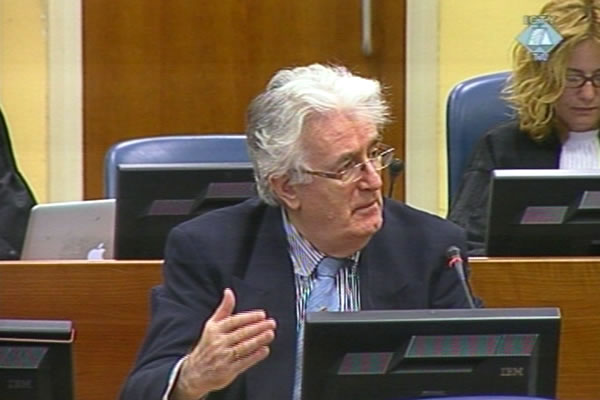Home
KARADZIC’S PROOF OF ‘HOLBROOKE AGREEMENT’
Radovan Karadzic’s bid to stay proceedings against him by invoking a purported agreement with Richard Holbrooke has failed, and now he wants the judges to accept the agreement as ‘a mitigating circumstance’ in sentencing
 Radovan Karadzic in the courtroom
Radovan Karadzic in the courtroom If he is convicted, Radovan Karadzic believes that a purported agreement with former US state secretary Richard Holbrooke from July 1996 could be used as a ‘mitigating circumstance’ in sentencing. In line with the Trial Chamber’s order to present all his arguments, including those that pertain to sentencing, by the end of the defense case slated for March 2014, Karadzic has informed the judges he intends to prove that he really did have an agreement with Holbrooke protecting Karadzic from prosecution provided he renounced public office.
The accused initially planned to call 12 witnesses to testify about the Holbrooke agreement but in the meantime he opted for a more restrictive approach due to lack of time. Karadzic reduced the number of witnesses to two, but wants to admit into evidence the depositions of ten witnesses he would not call to testify live. In Karadzic’s view, the witnesses corroborate his argument.
On 18 July 1996, Momcilo Krajisnik and Aleksa Buha attended a meeting with Slobodan Milosevic in Belgrade, on behalf of the Bosnian Serb leadership. In his recent evidence in Karadzic’s defense, Krajisnik said that at the meeting Holbrooke proposed a ‘gentlemen’s agreement’ promising Karadzic that the Tribunal would become a ‘thing of the past’ if he agreed to withdraw from politics. In his motion, Karadzic notes that Aleksa Buha also heard something to that effect; the accused will thus call Buha as a witness. Karadzic also plans to call the Republika Srpska prime minister at the time, Radomir Lukic. ‘Immediately after the meeting’ Lukic was briefed about the agreement with Holbrooke.
The defense intends to depose persons who were told by Karadzic in Pale that he had reached an agreement with Holbrooke about dropping the charges against him. Among them are Israeli-American businessmen Victor Ben Cnaan and Walter Hein, New York Times reporter David Binder and Obrad Kesic, American analyst of Serb origin. All of them were in Pale between July and September 1996 and Karadzic allegedly told them about the Holbrooke agreement. British major John Petrie, former official in the Office of the High Representative for BH, was also there at the time. Petrie claimed that at a meeting Holbrooke said Karadzic would not face trial according to the agreement.
The local witnesses include the accused’s closest relatives: his wife Ljiljana, daughter Sonja, son-in-law Branislav Jovicevic, family friend Dragan Draskovic and a businessman from Pale, Punisa Lukic. All of them claim that Karadzic told them there was no need for him to fear the arrest and extradition to The Hague. Karadzic also wants to tender into evidence parts of the book by American professor Charles Ingrao, who investigated the claims about the purported agreement with Holbrooke. He also wants the judges to look at the writings by former Bosnian ambassador to the UN, Muhamed Sacirbej, who claims US diplomat Robert Frowick told him that Karadzic wouldn’t be put on trial in The Hague.
The accused invoked the purported agreement with Holbrooke at the beginning of the trial, when he wanted the UN Security Council to issue a resolution granting him immunity from criminal prosecution for genocide and war crimes. A while later, he invoked the same arguments when he urged the Trial Chamber to stay proceedings against him, to no avail.
Linked Reports
- Case : Karadzic
- 2013-12-19 PROFITEERING BEFORE MURDER
- 2013-12-18 PRISONERS IN COWSHEDS
- 2013-12-17 STAKIC: CRIMES AND FORCIBLE EXPULSIONS OF PRIJEDOR INHABITANTS ARE A FACT
- 2014-01-16 ‘STRONG’ EVIDENCE THAT SERBS ARE NOT RESPONSIBLE FOR MARKALE 2
- 2014-01-16 ‘VOLUNTARY DEPORTATION’
- 2014-01-17 AVENGER OR JUST OBSERVER
